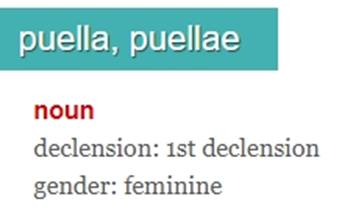Some features of Latin grammar are far more important than
others. This one is fairly minor, but still needs to be recognised and known.
When young learners are becoming familiar with, for example,
plurals, they will normally start with friend(s), house(s), pen(s) and so on.
Then, as youngsters, they will generally and unquestioningly learn man > men
(Anglo-Saxon menn), sheep > sheep (Anglo-Saxon: sċēp; singular and plural)
child > children (Anglo-Saxon ċildru ) i.e. these nouns come from a
different declension pattern in Old English and have retained their
plural forms. A five-year-old, however, isn’t that concerned about why ‘child’
becomes ‘children’, but you may be curious about why he said Hustoniae habitō in
the video.
Hustoniae habitō: I live in Houston
When we say in a place or on a
place in Latin, we use in + ablative:
In argentāriā labōrō. I work in a
bank.
Liber meus in mēnsā est. My book is on the
table.
Mārcus in hortō sedet. Marcus is
sitting in the garden.
However, the form being used in the video is the locative
case. This case did exist in Latin but finally merged with the ablative
although, in some instances, an old locative case ending still appears. If you
look up the tables of nouns in, for example, wiktionary, no locative
form will be listed unless the noun in question has one.
[i] There is a handful of nouns that have a
locative; the examples that are most common and most quoted in grammar books
are listed below, and one of them you have already seen. No preposition
is used; the case ending alone conveys the idea of being at / in / on a
place.
domus: house > domī: at home e.g. Mārcus domī est. Marcus
is at home.
humus: ground > humī: on the ground e.g. Humī sedent.
They’re sitting on the ground.
bellum: war > bellī: in battle
Valēte, iūdicēs iūstissimī, domī, bellīque, duellātōrēs
optimī (Plautus) ¦ Fare ye well, at home, most upright judges, and in
warfare most valiant combatants.
rūs: countryside > rūrī: in the countryside
In the video he referred to “in nātūrā” (in nature; in the
natural world) but, if he’d said that he liked to go for a walk “in the
countryside”: Mihi perplacet rūrī dēambulāre” i.e. rūrī has its
own locative ending to express the idea.
[ii] The locative is used with the names of “cities, towns
and small islands”; that’s the standard answer! With cities and towns, it’s
clear:
Rōma: Rome > Rōmae [the ending is the same as the
genitive singular]: in Rome; you don’t say *in Rōmā*
Lutetia: Paris > Lutetiae: in Paris
Hustonia (New Latin): Houston > Hustoniae: in
Houston
Corinthus: Corinth [the ending is the same as the genitive
singular] > Corinthī: in Corinth
Londinium: London > Londiniī: in London
Eborācum: York > Eborācī: in York
Brundisium: Brundisium (Brindisi) > Brundisiī: in
Brundisium
Pliny writes of his uncle:
Erat Mīsēnī classemque imperiō praesēns regēbat. ¦ He
was at Misenum and was personally commanding the fleet.
Some place names in Latin are plural; their locative forms
are the same as the ablative and so the only point you have to remember is that
they don’t use prepositions
Athēnae: Athens > Athēnīs: in Athens e.g. Athēnīs nātus
est. He was born in Athens.
Pompeiī: Pompeii > Pompeiīs: in Pompeii
There’s a bit more – only a bit – that needs to be talked
about with regard to these, but I think that’s enough for the moment to explain
why he said Hustoniae habitō in the video. The key point
to remember is that when you say in a named town or city, a
locative case with no preposition is used.
** What is written below is more for interest and to show
that, when studying Latin, there will be points which are not absolutely clear
or consistent. They’re not of crucial importance. **
How do you define a small island? It’s a
neat phrase to remember that the locative is used with the names of “towns,
cities and small islands”, it trips off the tongue and it trips off
the page of every grammar book you pick up, most of those books tending to
avoid further discussion on the matter. And when writers on Latin are avoiding
discussion, that suggests not all is quite what it seems!
It’s a small point but it’s a good example of looking at the
language in slightly greater depth and using the authors for reference.
Does English distinguish between large and small islands in
the way that the Romans did? Britain is an island and so is Ireland, and we
would say in Britain (La. in Britanniā) and in Ireland
(La. in Hiberniā) i.e. large land masses with very many settlements,
but when the island gets smaller – sometimes with one or very few settlements -
there can be a “shift” to on e.g. on Anglesey, on Sark, on the
Isle of Wight. Not every English speaker makes that shift, but at this point
Latin would step in with the locative case.
Crēta: Crete > Loc. Crētae [locative]: on Crete
A large island such as Sicily with several settlements would
be “in Siciliā” [ablative]:
Gāius ¦ [i] Syrācūsīs ¦ [ii] in Siciliā ¦
habitat. Gaius lives ¦ [i] in Syracuse ¦ [ii] in Sicily.
[i] Syrācūsae [pl.]: Syracuse > Locative. Syracūsīs:
in Syracuse; that’s a place name and it takes a locative, full stop.
[ii] in Siciliā: not considered a small island and
so in + ablative is used just like you would say “in” with any
other noun
In Cicero and Plautus, however, we find:
“Rhodī [locative] enim” inquit “ego nōn fuī” (Cicero) ¦
“For I,” he says “Was not on Rhodes”
Samia mihi māter fuit: ea habitābat Rhodī [locative].
(Plautus) ¦ Samia was my mother: she lived on Rhodes.
Rhodos: Rhodes > Loc. Rhodī: on Rhodes i.e. considered to
be a small island and adheres to the rule.
Caesar paucōs diēs in Asiā morātus cum audīsset Pompēium Cyprī [locative]
vīsum (Caesar) ¦ When Caesar, having stayed for a few days in Asia had heard
that Pompeius had been seen in Cyprus.
Cyprus > Loc. Cyprī: in / on Cyprus i.e. considered (by
Caesar) to be a small island.
However, did the perception of individuals vary, just like
our own perceptions vary? Are all the writers consistent in what forms they
use? Look at the next quotation where both are used in the same sentence, and
note how Caesar wrote Cyprī but Varro writes in Cyprō.
Itaque Crētae [locative] ad Cortȳniam dīcitur platanus
esse, quae folia hieme nōn āmittat, itemque in Cyprō ... [in +
ablative] (Varro)
Thus near Cortynia, on Crete, there is said to
be a plane tree which does not shed its leaves in winter, and another in
Cyprus ...






































